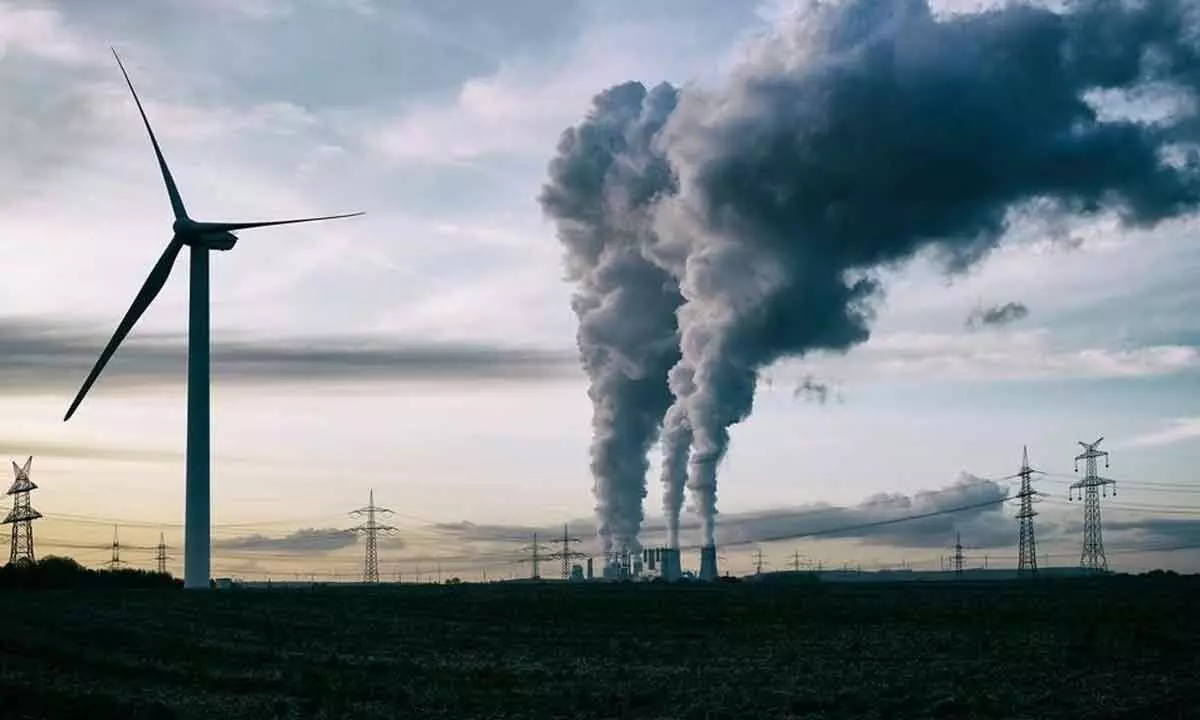Climate stocktake presents gloomy picture

While the Paris Agreement has spurred action on climate change around the globe, current policies and promises to cut greenhouse gas emissions still leave the world on a trajectory that falls far short of the agreement’s aim to limit warming to less than 1.5 degrees Celsius (2.7 Fahrenheit) compared with preindustrial temperatures. Governments worldwide plan to produce twice as much fossil fuel in 2030 than would be allowed under a 1.5 C warming pathway
When this year’s United Nations Climate Change Conference begins in late November 2023, it will be a moment for course correction. Seven years ago, nearly every country worldwide signed onto the Paris climate agreement. They agreed to goals of limiting global warming – including key targets to be met by 2030, seven years from now.
A primary aim of this year’s conference, known as COP28, is to evaluate countries’ progress halfway to the 2030 deadlines.
Reports show that the world isn’t on track. At the same time, energy security concerns and disputes over how to compensate countries for loss and damage from climate change are making agreements on cutting emissions tougher to reach.
But as energy and environmental policy researchers, we also see signs of progress.
Global stocktake raises alarms
A cornerstone of COP28 is the conclusion of the global stocktake, a review underway of the world’s efforts to address climate change. It is designed to pinpoint deficiencies and help countries recalibrate their climate strategies.
A report on the stocktake so far stressed that while the Paris Agreement has spurred action on climate change around the globe, current policies and promises to cut greenhouse gas emissions still leave the world on a trajectory that falls far short of the agreement’s aim to limit warming to less than 1.5 degrees Celsius (2.7 Fahrenheit) compared with preindustrial temperatures.
Governments worldwide plan to produce twice as much fossil fuel in 2030 than would be allowed under a 1.5 C warming pathway, another UN-led report released in early November found. A climate agreement announced on November 14, 2023, between the US and China to support tripling global renewable energy capacity by 2030 could help move that needle.
Limiting global warming to 1.5 C rather than 2 C (3.6 F), may appear to be a minor improvement, but the accumulated global benefits of doing so could exceed US$20 trillion.
A September 2023 report on the global stocktake process estimated the emissions cuts, measured in gigatons of carbon dioxide equivalent, needed by certain years to stay within the Paris Agreement goals. NDCs, or nationally determined contributions, are countries’ formal pledges to reduce emissions. Technical Dialogue of the First Global Stocktake Synthesis Report
Escalating greenhouse gas emissions are the primary factor driving the rise in global temperatures. And fossil fuels account for over three-quarters of those emissions. To avoid overshooting 1.5 C of warming, global greenhouse gas emissions will have to fall by about 45% by 2030, compared with 2010 levels, and reach net zero around 2050, according to the Intergovernmental Panel on Climate Change.
But emissions aren’t falling. They rose in 2022, surpassing pre-pandemic levels. The global average temperature briefly breached the 1.5 C warming limit in March and June 2023. A line chart of daily temperatures since 1940, by month. 2023 veers sharply upward around May, reaching above the line showing a 1.5 C increase.
The global stocktake unambiguously states that, to meet the Paris targets, countries must collectively be more ambitious in cutting greenhouse gas emissions. That includes rapidly reducing carbon emissions from all economic sectors. It means accelerating adoption of renewable energy such as solar and wind power, implementing more stringent measures to stop and reverse deforestation, and deploying clean technologies such as heat pumps and electric vehicles on a wide scale.
Significance of ending fossil fuels
The report underscores one point repeatedly: the pressing need to “phase out all unabated fossil fuels.” Fossil fuels currently make up 80% of the world’s total energy consumption. Their use in 2022 resulted in an all-time high of 36.8 gigatons of CO2 from both energy combustion and industrial activities. Despite the risks of climate change, countries still provide huge subsidies to the oil, coal and gas industries. In all, they provided about US$1.3 trillion in explicit subsidies for fossil fuels in 2022, according to the International Monetary Fund’s calculations. China, the US, Russia, the European Union and India are the largest subsidizers, and these subsidies sharply increased after Russia’s invasion of Ukraine in 2022 disrupted energy markets.
UN Secretary-General António Guterres has stressed the importance of transitioning away from fossil fuels, criticizing the extensive profits made by “entrenched interests” in the fossil fuel sector.
African countries also made their view of subsidies clear in the “Nairobi Declaration” at the first Africa Climate Summit in 2023, where leaders called for the elimination of inefficient fossil fuel subsidies and endorsed the idea of a global carbon tax on fossil fuel trade.
Solutions for an equitable transition
Several initiatives have been launched recently to expedite the move away from fossil fuels. In July 2023, Canada unveiled a strategy to terminate inefficient fossil fuel subsidies, becoming the first G20 nation to pledge a halt to government support for oil and natural gas, with some exceptions.
The European Union is broadening its carbon market to include emissions from buildings and transport, targeting decarbonization across more sectors. Concurrently, the United States’ Inflation Reduction Act commits US$10 billion to clean energy projects and offers $4 billion in tax credits to communities economically affected by the coal industry’s decline.
To help low-income countries build sustainable energy infrastructure, a relatively new financing mechanism called Just Energy Transition Partnerships is gaining interest. It aims to facilitate cooperation, with a group of developed countries helping phase out coal in developing economies that are still reliant on fossil fuels.
South Africa, Indonesia, Senegal and Vietnam have benefited from these partnerships since the first was launched in 2021. The European Union, for instance, has pledged to support Senegal’s shift from fossil fuels to renewable energy. This includes managing the economic fallout, such as potential job losses, from shutting down fossil fuel power plants, while ensuring electricity remains affordable and more widely available.
By COP28, a comprehensive plan to help Senegal aim for a sustainable, low-emissions future should be in place. France, Germany, Canada and various multilateral development banks have promised to provide 2.5 billion Euros (about US$2.68 billion) to increase Senegal’s renewable energy output. The goal is for renewables to account for 40% of Senegal’s energy use by 2030.
To align with the Paris Agreement objectives, we believe global initiatives to reduce fossil fuel dependency and invest in developing nations’ sustainable energy transition are essential. Such endeavors not only champion reducing greenhouse gas emissions but also ensure economic growth in an environmentally conscious manner.
(Hua-Ke Chi is a Junior Research Fellow in Climate Policy, The Fletcher School, Tufts University, and Jagnani is Assistant Professor of Economics at the same school)














